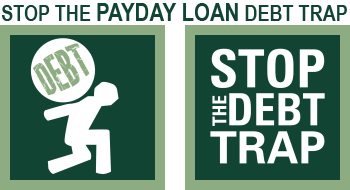Agency decision to rescind bank payday guidance draws criticism from more than 100 faith leaders, consumer advocates, civil rights organizations across U.S.
WASHINGTON, D.C. – One day after the Office of the Comptroller of the Currency (OCC) rescinded its 2013 guidance to curb predatory bank payday loans, more than 100 faith leaders, consumer advocates, and civil rights organizations from across the country responded by urging banks to commit not to enter, or reenter, this debt trap market.
The 100+ groups sent the OCC a copy of a letter urging banks to pledge that they will not start making payday loans. The letter also urges banks to oppose the rollback of the important consumer protections that keep other banks from doing so. The OCC’s action to rollback guidance on “deposit advance” loans, which are toxic 300% APR payday loans, will make it easier for banks to make loans designed to trap customers in debt, including older Americans who receive social security.
These unaffordable bank payday loans were widely condemned by community and civil rights organizations, faith and military leaders, and many state and federal lawmakers. Wells Fargo stands to profit off this recent OCC decision as it was notorious for making these abusive payday loans before agency guidance was put in place in 2013.
The OCC’s announcement comes after the American Bankers Association called for repeal of the rule earlier this year. The OCC noted the release of the Consumer Financial Protection Bureau’s (CFPB) new rules on payday lending as justification for the repeal, but the CFPB’s rule will not go into effect until 21 months after publication in the Federal Register.
In today’s letter, the group wrote, “[P]ayday loans create debt traps that cause severe harm to borrowers, including delinquency and default, overdraft and non-sufficient funds fees, increased difficulty paying mortgages, rent, and other bills, loss of checking accounts, and bankruptcy. These loans disproportionately impact communities of color, leaving them more disproportionately underserved by the banking mainstream. Payday lending by banks also undermines state law in the states that have prohibited or imposed meaningful restrictions on payday loans in recent years, or that have never allowed payday loans to be part of their marketplace.”
Six banks—Wells Fargo, US Bank, Regions Bank, Fifth Third Bank, Bank of Oklahoma and GuarantyBank—were making predatory payday loans to their own account holders until 2013, when a public outcry and risks to the banks’ safety and soundness led bank regulators to establish commonsense guidelines to curb these unaffordable loans. The banks were siphoning $500 million annually from customers who were caught in a devastating debt trap structured just like storefront payday lending.
Like storefront payday lenders, the six banks that were making payday loans marketed them as an occasional bridge to the next payday, not meant for long-term use. But in 2011, CRL documented that the median bank payday borrower had 13.5 loans per year and was in debt at least part of six months annually. And in 2013, the CFPB found that borrowers spent an average of 114 days during the year in triple-digit debt. And CRL also found that more than half of borrowers had more than ten loans annually, 12% had more than 30 loans annually, and that a quarter of the loans went to seniors who receive social security.
The extreme harm payday loans cause borrowers has motivated communities, advocates, and policymakers to address the practice. Data has shown that payday loans result in increases in difficulty paying living expenses, delinquency on credit card and other debt, delayed medical care, overdraft fees, loss of checking accounts and bankruptcy.
In their 2013 guidance, the OCC and the Federal Deposit Insurance Corporation advised the banks they oversee that they must assess the ability of their customers to repay the loans without getting into deeper financial trouble. Instead, the banks generally got out of the business.
A copy of the letter and list of organizations opposing banks’ debt trap payday loans and opposing the repeal of the OCC guidance can be found here.
If you would like to speak with a policy expert on this topic please contact ricardo.quinto@responsiblelending.org.
